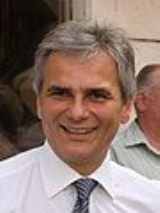
Chancellor of Austria
Encyclopedia
The Federal Chancellor is the head of government
in Austria
. Its deputy is the Vice-Chancellor. Before 1918, the equivalent office was the Minister-President of Austria. The Federal Chancellor (also known more simply as the Chancellor) is considered to be the most powerful political position in Austrian politics.
. The Chancellor assumes his office immediately after the appointment and is sworn in by the president.
In theory, the President can select anyone he wishes to be Chancellor. In practice, since the National Council
has the right to pass a motion of no confidence
in the government at any time, the Chancellor is always the leader of the majority party in the chamber or the biggest party in the governing coalition.
The political power of the Chancellor mainly derives from his power in his political party, which he normally chairs, and can vary a lot depending on whether there is a coalition or a single-party cabinet. Normally the Chancellor is the leader of the biggest party in the Austrian parliament, however the Federal President is free to appoint any other person also. In 2000 the Federal president appointed Wolfgang Schüssel
although his party then had only been 3rd in the previous elections.
Head of government
Head of government is the chief officer of the executive branch of a government, often presiding over a cabinet. In a parliamentary system, the head of government is often styled prime minister, chief minister, premier, etc...
in Austria
Austria
Austria , officially the Republic of Austria , is a landlocked country of roughly 8.4 million people in Central Europe. It is bordered by the Czech Republic and Germany to the north, Slovakia and Hungary to the east, Slovenia and Italy to the south, and Switzerland and Liechtenstein to the...
. Its deputy is the Vice-Chancellor. Before 1918, the equivalent office was the Minister-President of Austria. The Federal Chancellor (also known more simply as the Chancellor) is considered to be the most powerful political position in Austrian politics.
Appointment
The Chancellor is appointed by the President of AustriaPresident of Austria
The President of Austria is the federal head of state of Austria. Though theoretically entrusted with great power by the constitution, in practice the President acts, for the most part, merely as a ceremonial figurehead...
. The Chancellor assumes his office immediately after the appointment and is sworn in by the president.
In theory, the President can select anyone he wishes to be Chancellor. In practice, since the National Council
National Council of Austria
The National Council is one of the two houses of the Austrian parliament. According to the constitution, the National Council and the complementary Federal Council are peers...
has the right to pass a motion of no confidence
Motion of no confidence
A motion of no confidence is a parliamentary motion whose passing would demonstrate to the head of state that the elected parliament no longer has confidence in the appointed government.-Overview:Typically, when a parliament passes a vote of no...
in the government at any time, the Chancellor is always the leader of the majority party in the chamber or the biggest party in the governing coalition.
Role and powers
The Chancellor is "primus inter pares" ("first among equals") in the Austrian government. He chairs the meetings of the Austrian government but has no power to instruct other Federal Ministers. He is not the head of state, nor is he the commander in chief of the Austrian Armed Forces. Both roles are vested with the Federal President. The Chancellor cannot appoint nor dismiss other federal ministers. He can only recommend such an action to the Federal President, who may then appoint or dismiss a minister. However, it has become a very strong constitutional convention for the President to act on the Chancellor's advice. Furthermore the Chancellor normally also heads a federal ministry. Thus, although considered as the most powerful political position in Austria, he has a much weaker standing than the United States President or the Prime Minister of the United Kingdom.The political power of the Chancellor mainly derives from his power in his political party, which he normally chairs, and can vary a lot depending on whether there is a coalition or a single-party cabinet. Normally the Chancellor is the leader of the biggest party in the Austrian parliament, however the Federal President is free to appoint any other person also. In 2000 the Federal president appointed Wolfgang Schüssel
Wolfgang Schüssel
Wolfgang Schüssel is an Austrian People's Party politician. He was Chancellor of Austria for two consecutive terms from February 2000 to January 2007...
although his party then had only been 3rd in the previous elections.
See also
- Politics of AustriaPolitics of AustriaThe Politics of Austria take place in a framework of a federal parliamentary representative democratic republic, with a Federal Chancellor as the head of government, and a Federal President as head of state. Executive power is exercised by the governments, both local and federal...
- List of Chancellors of Austria
- Vice-Chancellor of Austria
- President of AustriaPresident of AustriaThe President of Austria is the federal head of state of Austria. Though theoretically entrusted with great power by the constitution, in practice the President acts, for the most part, merely as a ceremonial figurehead...
- List of Federal Presidents of Austria
- Lists of incumbents
- List of Ministers-President of Austria
- List of Austrian Chancellors by Longevity

